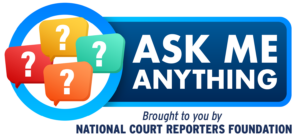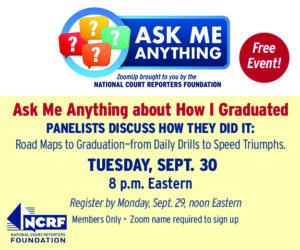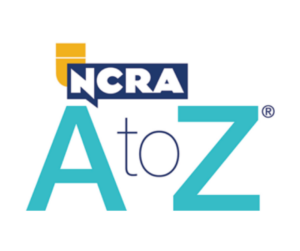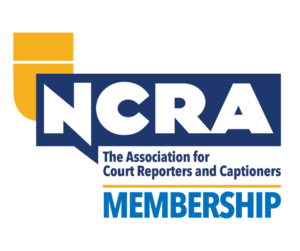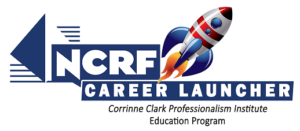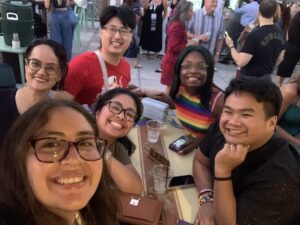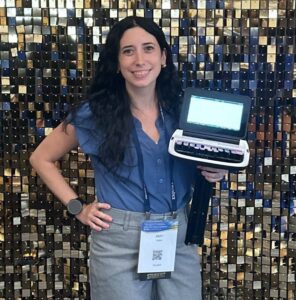
In this issue of Up-to-Speed, we shine the spotlight on Gabriella Agnello, who is a recent graduate of Plaza College in Forest Hills, NY. She now works as a freelancer.
UTS | How did you first get the idea of being a court reporter?
Agnello | When I was a senior in high school, I had not a clue what I wanted to do. I knew I wanted something fast, something I can excel in, and, of course, what everybody else wants, good pay. At 17 years old, not everyone knows exactly what they want to do. Unfortunately, I was one of those people. All of my friends had these big plans – one wanted to become a teacher, another an accountant — and I was very confused on my future. Two women I had been going to the gym with were freelance court reporters, and they really opened up my mind to considering this field. I did a little research on stenography and wished I had gone in sooner. It really is an amazing field with plenty of opportunity.
UTS | Can you talk a little about your background?
Agnello | I have always been interested since my senior year of high school in the court reporting profession, but I didn’t pursue it right out of high school. Three of my friends are court reporters, so I’ve always had an interest in the field. They always said such great things about their jobs, always spoke about how much they loved it and the financial perks, of course. Straight out of high school, I decided to go with my second interest, which was math. I graduated Baruch College with a bachelor’s degree, but I was not satisfied or happy with my decision. I then decided to look up court reporting programs, and fortunately stumbled upon this one! The rest is history.
UTS | What skill sets do you think would be helpful for a court reporter to possess?
Agnello | I definitely think literary skills are very helpful for a court reporter to possess. When I first started this school, I had not taken an English class for quite some time. I forgot the basic rules of punctuation, grammar, etc. As a skilled court reporter, you need to be able to produce an accurate transcript.
UTS | What kinds of challenges have you faced during your court reporting program?
Agnello | The challenges I have faced during my court reporting program would have to be the struggle with speed. Some weeks I felt that I maintained my new speed and was able to progress very quickly to an even faster speed. Other weeks, I found myself stuck or stagnant at one speed, and it became very frustrating. I also am a very nervous person, so test-taking is not my specialty. I would be able to write cleaner during class, but then when the test came, I did very poorly. Confidence and practice are keys to going through the court reporting program.
UTS | Did a mentor help you out while in school?
Agnello | Truthfully, all of my teachers have been my mentors in school. Starting with my first teacher, Ms. Gorman. She taught me the foundation of the court reporting language, how to use it, how to make briefs, etc. Mr. Garzon and Mr. P. were the middle mentors in my court reporting program. They helped me gain speed, add more briefs in my dictionary, and open my mind up to new material that I may have in work one day. Finally, Ms. Warmuth was my last mentor to close up my chapter. She took what all of the previous mentors had molded me into and perfected it. She taught me that in this field, you have to have drive, confidence, skill, and accuracy. Any little issue or problem that I had left before graduating, she made sure that it was fixed. I never was afraid to ask any of my teachers anything, because I knew they would be there to help me along the way. That is very important and crucial to have during this process. They are a great support system, and that’s exactly what every court reporting student needs.
UTS | What is the best advice you’ve been given so far?
Agnello | The best advice I have been given so far has come from many people in this field I have come across. It is to never be that comfortable. That applies to when you’re in class, you’re taking a test, or at work. There is always room for growth and for improvement.
UTS | If you were to go to a high school career fair to recruit students, what would you say to them about a career in court reporting and captioning?
Agnello | If I were to go to a high school career fair to recruit students, I would tell them that this field has a lot of potential and growth for young people like themselves. Unfortunately, no one came to my high school to teach me about this type of profession, so I was completely clueless about what it was. I think students in the program now are perfect examples for new students who want to pursue a career in this field. You can work as an independent contractor, you can work for any one of the courts, and you can work in captioning. There is so much diversity in court reporting which allows each person to find their own direction that suits them.
UTS | Where do you see the profession of court reporting and captioning 10 years from now?
Agnello | In 10 years, I see the profession of court reporting expanding, in terms of technology and employees. There is a shortage of court reporters now, and that is because the word about this profession isn’t spread enough. I feel like more people will be knowledgeable in stenography by that time. Technology will help the profession. Technology does not have the power or capability to replace a human’s skill. Every person speaks differently. Some may have an accent, some may not speak properly, and some may have just a very low voice. These are all reasons why a court reporter needs to be present. We need to make sure that we produce an accurate record, and I do not feel like technology can accurately do that. Technology will help continue to advance the court reporting equipment and programs and help make everything more efficient for the job.


